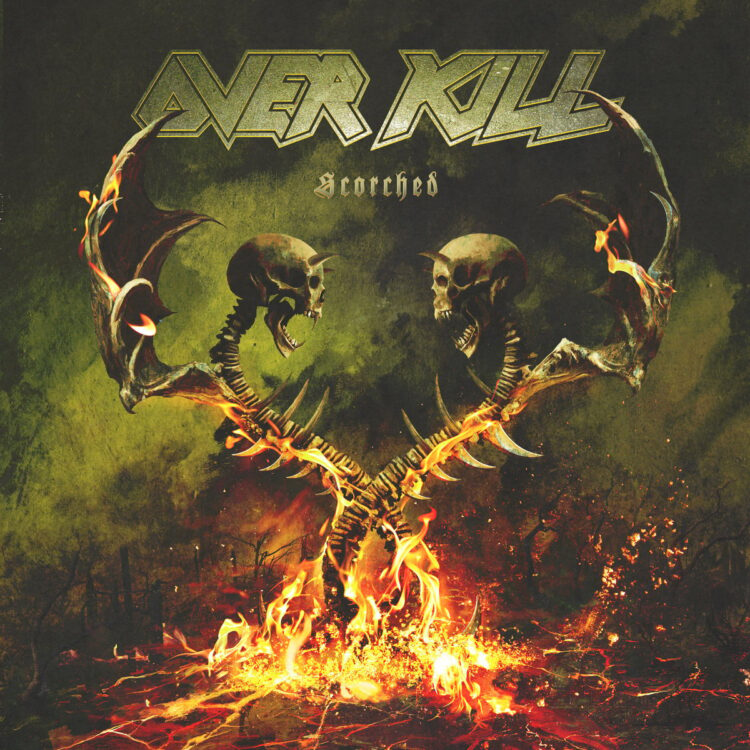There are two factors of consideration going into Scorched, the 20 th(!) album from these Previous Bridge, NJ greybeards Overkill. The primary is how the thrash steel veterans have sounded totally revamped and revitalized since 2010’s Ironbound. For these protecting rating, that is a decade-plus of a violently spiky and nearly flawless cherry on prime of a 43-year-long profession that wasn’t too shabby to start with. And secondly, with the pandemic forcing bands to retreat from the street and direct their energies solely in the direction of the artistic course of, one would suppose that almost all of releases popping out the ass-end of the previous two years would harbor vital enhancements and additional enhance upon the weather which made pre-pandemic output what it was.
The examples of bands whose newest releases have been extra elaborate, intricate, deeper and simply plain higher are numerous (and we’re nonetheless counting). Fundamental arithmetic tells us that one (band who has been on a jet-fueled upward trajectory) plus one (having the time to discover and exploit all that has made that incline attainable) equals two (an absolute ripping barnburner of an album). Have Overkill achieved this specific Boy Scout badge in metallic arithmetic with Scorched? Umm, sorta.
As per regular, frontman Bobby “Blitz” Elsworth affords up his happy-go-lucky, sand paper scowl and inventively catchy vocal strains. Dave Linsk‘s guitar leads are well-sculpted, well phrased and fall someplace between guitar god shred and virtuoso juke joint sloppiness. And bass gamers all over the place who really feel misunderstood and missed can proceed to rally round Carlo “D.D.” Verni, his ball-punching tone, prominence within the combine and the way in which he drives lots of the riffs/songs with a thick city twang. The draw back is that there is one thing lacking with Scorched. Often the time period je ne sais quoi is used to indicate an inexplicable piece that elevates one thing above the pale. On this case, je ne sais quoi appears like there is a mysterious one thing lacking; like doing an intensive jigsaw puzzle however not realizing a handful of items are lacking till it is virtually accomplished.
The album’s opening title observe fires off a tremendous trend flare with finger-tapping melodies and an …And Justice For All cavalcade of crashing chords and palm muting shimmy through which Blitz sounds as vitriolic and very important as ever. Woe be to whomever that refrain is directed at! Nevertheless, the track additionally places on show the primary of a sequence of questionable track writing choices, if not the pervasive weak point that weaves out and in of this album. It comes on the 4:17 mark the place they decelerate an already half-time bridge and dissipate the guitars to go away a piece of the track feeling empty. Granted, it picks up once more as they repeat the preliminary sequences that originally made it cool, and the solo is a unusual masterpiece, however that exact transfer could not have been the slickest, most well-thought out of the yr.
“Goin’ House” (track writing legislation dictates that one ought to by no means give the advantage of the doubt to any title that drops the “g” in favor of an apostrophe — these songs should work twice as arduous to be half pretty much as good!) sounds prefer it was written round its refrain. It is an infectious handful of seconds drenched in layered melody and a heat vocal embrace, however a lot of the trail there’s plagued by what any band farting round in a storage might have provide you with. However once more, the lead work is stellar.
“The Surgeon” and “Tougher They Fall” are bouncy and staccato melodic thrash ragers all closely rooted in “Blackened,” with energetic lashing guitars and terse drums propped up by a refrain that runs the gamut from epic melodic sweetness to street-wise gang vocals. “Twist of the Wick” sups on the similar nicely, however comes up brief with the inclusion of a meandering and chanted mid-section which completely takes the wind out of the track’s sail. One other questionable artistic detour that flops and wilts as an alternative of flips tables. And talking of lack of desk flipping panache, the ineffectual ballad “Fever” feels prefer it’s one thing that obtained pulled from one scrap heap and thrown onto one other in an effort to fulfill a temporal contractual obligation.
Because the album goes on, songs like “Will not Be Coming Again” and “Know Her Title” bake themselves in tropes and typicality that in and of themselves aren’t horrible, however lack the ovarian-fortitude of what is turn into anticipated of Overkill, particularly over the course of their final 5 albums. Having stated that — and to repeat myself — Elsworth nonetheless feels like he is gargling velvet, bleach and gravel and Linsk‘s lead guitar work exceptionally straddles strains between prog and basic rock in addition to thrash steel royalty.
I do not wish to give the impression that Scorched is a poor or lackluster launch. Even when there are components of it that do not dwell as much as the excessive bar the band have set for themselves lately. That is not a nasty downside to have — it might be worse, they might be have been perpetuating a poor imitation of themselves over the past decade — however it’s a troublesome downside to beat. In the end, even in the event you do not agree with a single phrase of the above, most anybody with purposeful ears can all discover loads of worth on Scorched. If not, we will all return and take heed to Ironbound, The Electrical Age, White Satan Armory, The Grinding Wheel and/or The Wings of Warfare.





